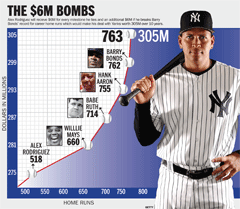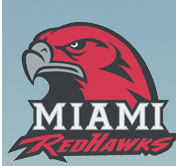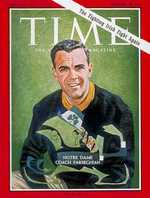Long-term deals - Are they for jocks only?
If you work for company in the United States, and are not a member of a Union, it is quite likely your employment agreement is know as 'Employment at-will'. What is Employment at-will? From LegalDictionary.com we find:
Traditionally, U.S. employers have possessed the right to discharge their employees at will for any reason, be it good or bad. The "at-will" category encompasses all employees who are not protected by express employment contracts that state that they may be fired only for good cause. "Good cause" requirements are typically a part of collective bargaining agreements negotiated by employee unions; nonunion workers rarely have this form of protection.
But you know what category of worker in the US frequently gets the protection and security of guaranteed employment contracts?
Profession athletes.
These top professional athletes in sports like baseball and basketball can sometime agree to contracts upwards of five years, and the very best can command staggering compensation:
 Source - nydailynews.com
Source - nydailynews.com
Alex Rodriguez of the Yankees recently agreed to a 10-year deal that may pay him up to $305M.
Not bad.
A-Rod is a top player, an all-time great, and it makes sense for the Yankees to lock up his services for essentially the remainder of his pro career. A-Rod can't decide on his own to jump ship and join the Red Sox next season.
But most organizations do not have the same assurances and control over their stars and top performers. Almost all of your top players are working under Employment-at-will arrangements. The best java developer, marketing analyst, or senior accountant can pack up their desks and march out tomorrow, maybe even to one of your competitors.
Almost all companies are willing to take the chance that great talent will leave in exchange for the ability to adjust staffing levels, downsize, and have total flexibility in workforce deployment.
However, if the latest economic data is to be believed, the long downturn is showing signs of ending, and leaders will soon be faced with more challenges.
A recent article in Forbes reports that over half of senior executives surveyed are extremely concerned about key employee retention once the recession ends:
65% reported they were highly or very highly concerned that high-potential talent and leadership would leave once the economy turns. And 52% of surveyed executives predicted an increase in voluntary turnover at their companies once the recession ends, four times the number expecting a decrease
The Forbes piece goes on to offer many familiar strategies to help retain high performers: increased engagement efforts, modifying compensation plans, and holding executives responsible for retention. Good ideas, but the article makes no mention of the strategy used in pro sports to ensure the best available talent won't simply walk out the door for a better deal somewhere else.
Contracts.
Why shouldn't the organization offer two or three-year deals to 'lock up' the very top tier of performers?
The organization can get the benefit of knowing (for at least a couple of years) that this critical talent will remain with your firm, and the employee gets at least some near term job security, even more important after the job losses of the last two years.
Of course these contracts limit the organization's flexibility to change course, and downsize, but if they are given to just the top tier of performers, then those are the last ones you would let go anyway, right?
And I don't want to hear about any 'double-standard' complaints, A-Rod has a 10 year $300M contract because he is a star, Nick Swisher 'only' plays under a 5 year $26M deal because he's a role player. Nick understands he's no A-Rod, and somehow he manages to show up at work every day and do his job.
So what do you think, time to 'lock-up' some of your star players?

 Steve
Steve




